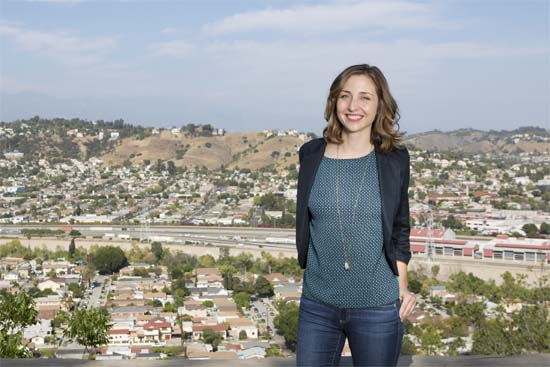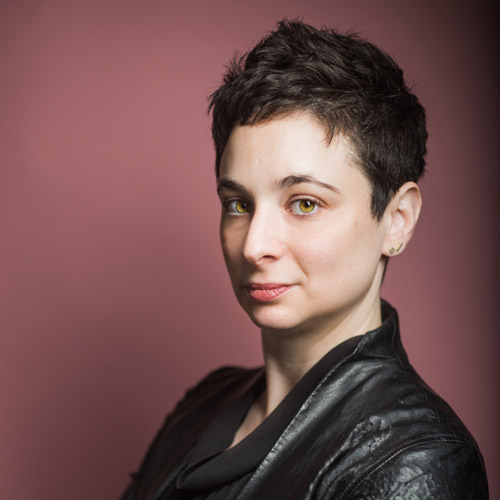From BU to Boston Legal and The Good Wife
COM alum landed dream job doing what TV writers know you should never do

Corinne Brinkerhoff (COM’04) has always loved TV, even though she had planned to be an astronaut. Photo by Noah Webb
Corinne Brinkerhoff’s career is a far cry from what she initially imagined for herself. An Emmy Award–nominated writer and producer of the legal dramas Boston Legal and The Good Wife and the Sherlock Holmes crime drama Elementary, Brinkerhoff (COM’04) has just signed on to develop new shows for CBS TV Studios—and as if she isn’t busy enough, she’s taking to the stage as a stand-up comedian.
BU Today recently spoke with Brinkerhoff about her work as a writer, producer, and developer for television.
BU Today: What were your favorite TV shows as a kid?
Brinkerhoff: I adored Moonlighting, even as a seven-year-old. The mysteries—the chemistry. And when I was in junior high, My So-Called Life. I felt like Angela Chase’s words were pulled straight out of my brain. I’ve always loved TV. I remember in fifth grade, my mom gave me the choice of watching Beverly Hills, 90210, or shaving my legs for the first time. I guess there wasn’t time for both that night. It was a tough call. On the one hand, I was remarkably hirsute for an 11-year-old—ridicule was imminent. On the other hand, some major stuff was going down with Brenda and Dylan.
When you started college, you planned to become an astronaut—and ended up with a bachelor’s degree in linguistics. Why did you switch?
It probably occurred to me that what I really wanted was the temporary thrill of being weightless and eating dehydrated ice cream. The years of studying aeronautical engineering were considerably less appealing. It’s hilarious to me now that I thought I could do anything but write.
Why did you choose BU for graduate school, and how did the program prepare you for your career?
It was one of the few graduate programs that concentrated specifically on television. Coming from the Midwest, I didn’t have a clear path to breaking into the industry. So the program was really helpful in giving me the basics I needed. The other day I was in a conversation about how the repeal of the Financial Interest and Syndication Rules changed TV, and I thought, thanks, Professor Cathy Perron (COM’99). Her class is the only reason I knew that.
The alumni connections were also incredibly valuable. I did the BU spring break alumni-networking trip in 2003, which is how I ended up getting the internship at DEK Productions that started my career. The same day we went to DEK Productions, which is run by David E. Kelley (LAW’83), we also met with Andrew Kreisberg (COM’93), creator of the CW’s Arrow, who has been a close friend and mentor ever since.
You became Kelley’s personal assistant and when you told him you wanted to write, he told you to pitch him story ideas for Boston Legal. How did he respond to your pitches?
I typed them up every week for a couple of months, with no response. I completely understood—the guy is a titan of the TV industry, and he had his hands full without poring over the half-baked notions of a production assistant. But I was young and eager, and I’d never written a spec script outside of BU classwork, so I took my two favorite ideas and wrote a spec for Boston Legal.
Then one day he came to the office and said, “Let’s talk about your ideas.” He liked 2 of them out of probably 40. As luck would have it, they were the same two I’d written into the spec script. I handed him the script and asked if he’d read it.
He called me the next day. I knew he’d be kind about it, because he’s a kind person, but I thought he’d give me polite notes and encourage me to pursue another area of the industry, something like, “Good effort. Do you have any interest in costume design?”
What did he actually say?
He said something along the lines of, “This is good. This should be an episode of the show.” I don’t remember exactly. I was in sort of a fugue state—the happy kind. Spec scripts of existing shows never get made. You’re never supposed to spec the show you want to write for. You’re never supposed to give the creator of the show your spec of that show. I was too green to know better. And I was incredibly lucky that someone like David was willing to give me a shot.
The script was about a teen refused emergency contraception by the Catholic hospital where she was treated for rape. When she found out she was pregnant, she sued the hospital. How did you come up with this story?
I had read a lot about the issue and was stunned that rape victims were actually being put in that position. We worked hard to fairly depict both sides of the issue, so I wasn’t expecting the blowback the episode received. I remember being so crushed by a letter from a Catholic organization claiming the episode was rife with mistakes and misrepresentations. I spent the weekend writing this big retort, citing statistics and information from the organization’s own website. One of the executive producers broke it to me gently that getting angry letters is part of the job. It’s a rite of passage.
On the flip side, I got a call from a woman with the ACLU of Pennsylvania, who headed an organization focused on increasing emergency contraception access for rape victims. She said that one episode of TV had done more for the issue than she had been able to do in 10 years. That was amazing to hear.
This episode also had real-world political impact, influencing the way a controversial emergency contraception law was enforced in Massachusetts. Could you tell us more?
Right before we started shooting, I discovered that a law had just been passed that required all Massachusetts hospitals to provide emergency contraception to rape victims. I started fact-checking and found a big discrepancy: there was still a conscience clause law exempting doctors at religious hospitals from having to offer medications or procedures that conflicted with their morals. Whether the new legislation superseded the existing conscience clause depended on whom you asked.
We proceeded with the story, embracing the ambiguity. What I didn’t know was that my attempt to get clarification on this issue evidently sparked a firestorm: both sides had been operating under the assumption that they had won this battle. Eventually, then-Governor Mitt Romney publicly stated that emergency contraception should be available to rape victims in every ER in Massachusetts. And it was.
Your next show, The Good Wife, is about a litigator (Emmy-winner Julianna Margulies) whose attorney husband goes to jail, so she returns to the law to support her children after 12 years as a stay-at-home mom. How did you become involved with the show and did it teach you something new about script writing?
My agent submitted me for it. They read my writing sample and set up a meeting with me. I guess it went well, because I got the job. I was terrified. I don’t think I spoke for the first three months. I guess they liked my scripts enough to let me stick around. My three years on that show really taught me how to build stories collaboratively in a writers’ room. There was an emphasis on making choices that subvert expectations and thinking visually instead of just verbally when writing a scene.
It was an extremely valuable experience—and lots of fun. We spent 45 hours a week together in a little room, and the other writers became my hilarious, neurotic little second family.
What drew you to Elementary, a contemporary take on Sherlock Holmes, with Jonny Lee Miller as a drug-addicted Holmes and Lucy Liu as Dr. Joan Watson?
I’d only done legal dramas and wanted to try something new—and I love the character of Sherlock Holmes. I feel like he’s the root of a number of popular antiheroes on TV today. The idea of Holmes as an addict in recovery was really interesting to me, as was the concept of male-female leads who were platonic partners. The evolution of that friendship and partnership is my favorite part—that, and coming up with clues and cases worthy of a Sherlockian intellect.
Of all the shows you’ve done, which episode are you most proud of?
My first Boston Legal—or the episode of The Good Wife called “Heart.” The emotional storyline dictated the legal storyline, and the result was an episode that really seemed to resonate with people.
You’re also a stand-up comedian. What drew you to stand-up, and how is writing comedy for yourself different from writing for actors?
I don’t think I can call myself a stand-up comedian yet. I dabble recreationally. I love good stand-up comedy more than just about anything, and I had always wanted to try it. It’s a thrill and a horror like nothing else. I just riff on my own life, so that’s easier than trying to capture a whole set of voices and situations that aren’t organic to me. On the other hand, you can write a TV script without having to get out of bed.
You’ve just signed on to develop new shows for CBS TV Studios. What does this process entail?
I’m new to it. From what I understand, you pitch ideas, and if you’re lucky, they ask you to write a pilot script. If you’re really lucky, they pick up the pilot for production. If you are outrageously lucky, they put that pilot on air. . .and the whole thing ages you about six years. That’s what I hear. I can’t wait.
A version of this story was originally published in the summer 2013 COMtalk.
Lara Ehrlich can be reached at lehrlich@bu.edu.

Comments & Discussion
Boston University moderates comments to facilitate an informed, substantive, civil conversation. Abusive, profane, self-promotional, misleading, incoherent or off-topic comments will be rejected. Moderators are staffed during regular business hours (EST) and can only accept comments written in English. Statistics or facts must include a citation or a link to the citation.